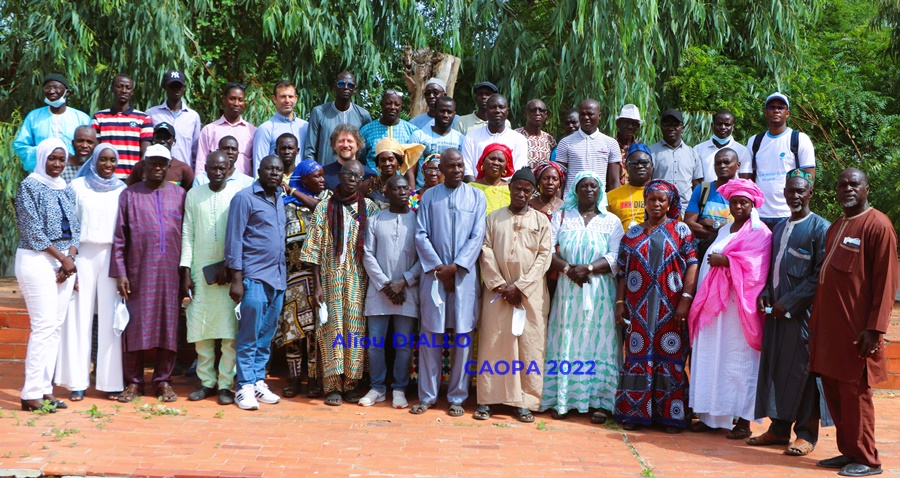Thirty-six (36) members of the Local Artisanal Fishing Councils (CLPA) of Fimela-Ndangane Sambou, Palmarin, Niodior, Djirnda and Bassoul are following, from June 14 to 17, 2022, training on the Voluntary Guidelines for Sustainable Small-scale Fisheries in the Context of Food Security and Poverty Eradication and on the Land Tenure Guidelines (SSF – VGGT)
The objective is to strengthen the knowledge of fisheries actors to enable them to appropriate the content of the Guidelines on artisanal fisheries and the VGGTs through the use of simple pedagogical tools accessible to grassroots communities.
This training is held within the framework of the “Coastal Fisheries Initiative, West Africa Component (CFI-WA)” project, which aims to provide sustainable environmental, social and economic advantages in West Africa through good governance, proper incentives and innovation.
Implementation is ensured through a partnership between the Food and Agriculture Organization of the United Nations (FAO) and the African Confederation of Professional Organizations of Artisanal Fisheries (CAOPA).
The National Administrator of the CFI/WA Project in Senegal, Amadou Oumar TOURE, explained the objectives of the Coastal Fishing Initiative Project, the issues and challenges, the overall amount, the intervention areas and the actors involved.
The Program Officer of #CAOPA, Mrs. THIAO Khady DIOP, underlined the role played by #CAOPA in the process of information and awareness-raising of professionals for the appropriation of the content of the Voluntary Guidelines for sustainable small-scale fishing and their implementation.
The different elements of the training guide on SSF and VGGT are understood;
- Knowledge and skills of the participants on the SSF and VGGT are shared and strengthened so that they are able to disseminate and apply them in the field for the benefit of the members of the Local Artisanal Fisheries Councils;
- Recommendations are made on the training guide in order to adapt it to the local context;
- Fishing actors are made aware of the need to maintain a clean and healthy environment.
In addition, this training will be used to raise awareness among fisheries stakeholders on the hygiene and sanitation standards important for the sustainable development of fishing activities.
Thus, the day of June 18, 2022 is planned for the cleaning of the Djifère beach and the awareness-raising on the harmful effects of plastic waste in the marine environment with the municipality of Palmarin.
- The training is provided by Mamadou FAYE, Expert Biologist of CAOPA, Ngagne MBAO, Expert Biologist of CAOPA, and EL Hadji Abdoulaye COUME, Fisheries Engineer, CAOPA Expert. They are supported by Edoardo CalzaBini, FAO Expert and Mauro Conti, FAO Expert.
Check our facebook page for more communication materials about the training.
Aliou DIALLO
More about the CFI Project:
The Coastal Fisheries Initiative (CFI) is a global collaborative effort funded by the Global Environment Facility (GEF) bringing together United Nations agencies (FAO, UNDP, UNEP), the World Bank and international conservation organizations (Conservation International, WWF) and relevant governments. Its overall objective is to contribute to the management of global coastal fisheries that provide sustainable environmental, social and economic benefits by creating better governance, including the right incentives, an enabling environment and the use of more holistic processes and integrated approaches. It consists of 5 interconnected projects in 6 countries (Cabo Verde, Côte d’Ivoire, Ecuador, Peru and Senegal) and 3 regions (West Africa, Latin America and Indonesia).
In West Africa, the CFI is implemented by the Food and Agriculture Organization of the United Nations (FAO) in partnership with the United Nations Environment Program (UNEP) in three countries: Cabo Verde, Côte d’Ivoire and Senegal.
CFI-WA targets the entire coastal zone fishery and the entire value chain. The overall objectives are to illustrate the value of holistic ecosystem management and improved governance for coastal fisheries (i) at the environmental level: by supporting responsible coastal fisheries and maintaining ecosystem services; (ii) at the development level: by increasing the economic and social value produced by coastal fisheries to support human welfare and livelihoods.
The specific objectives of the project are (i) to support the implementation of an ecosystem approach to fisheries (EAF) and a better application of international instruments, capitalizing on existing experiences; (ii) to focus interventions on specific sites; (iii) to give special attention to artisanal fisheries while targeting all types of fisheries; and (iv) to share experiences at national, regional and global levels.


